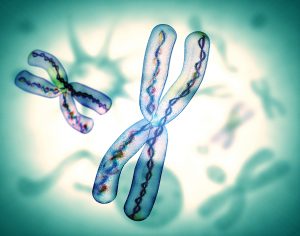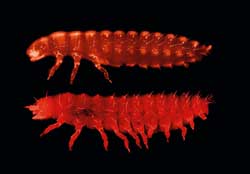Telomeres may be the crystal ball in longevity research.
Biologist Jonathan K. Alder knows when most of us are going to die. Okay, he doesn’t know the exact day or time, but the BYU physiology and developmental biology professor has a pretty good idea, thanks to his research on the tiny biological clocks attached to our chromosomes. These DNA end caps—kind of like the plastic cap on the end of a shoelace—are called telomeres, and they are one great predictor of life expectancy: the shorter your telomeres, the shorter your lifespan. Not only that, shorter telomeres also indicate a higher risk for bone marrow failure and liver, skin, and lung diseases.
“When we are born, our telomeres are longer. As you get older, they shorten,” explains Alder, who has been tinkering with telomeres, trying to identify ways to extend them and studying the gene mutations that cause them to be unnaturally short in some people.
Alder’s latest findings with Johns Hopkins University collaborators establish yet another link between telomeres and lung disease, directly connecting genetic mutations to pulmonary fibrosis and emphysema.
“Most people don’t realize that lung disease is the third most common cause of death in the United States,” says lead researcher Mary Armanios, associate professor of oncology at Johns Hopkins University School of Medicine. “Telomere research has its most significant direct public health benefit in the area of lung disease.”
The findings, published in the Journal of Clinical Investigation and in Chest, show that some of those who develop severe emphysema have mutations in one of the genes responsible for maintaining telomeres. Since mutations in telomere genes are known to cause pulmonary fibrosis, these findings link two diseases that were previously thought to be unrelated. And these mutations affect generations.
“Families with telomere mutations pass those down the line, meaning offspring start off with shorter telomeres,” says Alder. “With each passing generation the disease gets worse, and they get it at an earlier age.”
This new research could mean that those with telomere mutations who smoke—even for a brief part of life—could be at greater risk.
Each time a cell divides and replicates, the DNA at the end of telomeres shortens. And cell division happens throughout life, which explains why telomeres get shorter and shorter as we age. When the telomeres run out, the cell becomes inactive or dies, which leads to disease.
Scientists have figured out ways to lengthen telomeres, but they are no magic bullet: telomeres that keep their length can lead to other complications like cancer.
“This a definite Goldilocks situation,” says Alder. “Too little, you age prematurely; too much, you could get more serious diseases. You need to be just right.”










